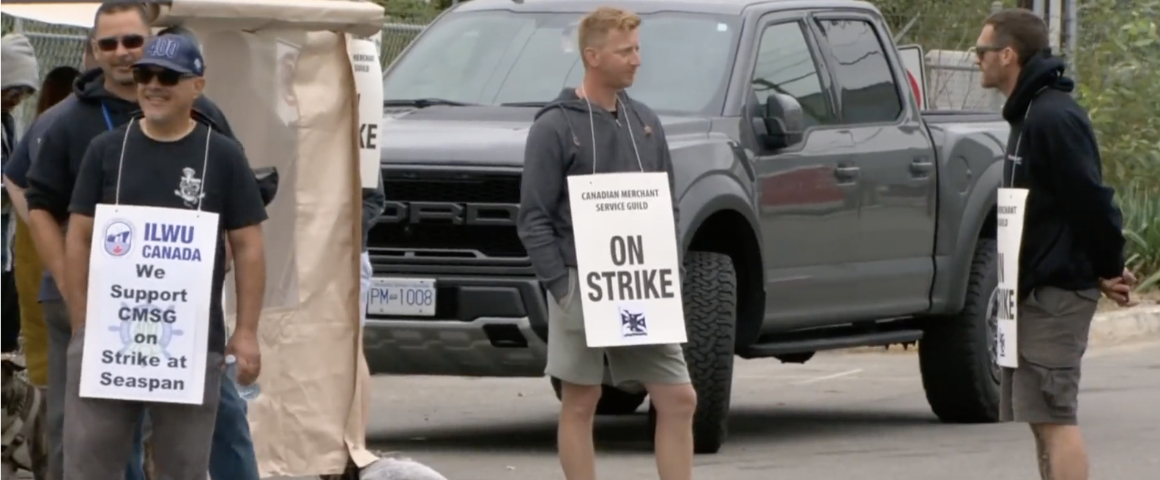Federally regulated workers no longer considered “persons”
BC Labour Opinion
Trouble is brewing for workers on the west coast, where a successful strike action is retroactively being declared illegal by the BC Labour Relations Board.
Reversing their 2022 ruling – in which the legal right of workers to refuse to cross a picket line was upheld at a picket line outside of Seaspan’s Vancouver Shipyards last year – the Labour Board has yielded to semantic quibbles by company lawyers in a decision which will be almost certainly used again against organized labour. Declaring that federally regulated workers are not considered “persons” under the BC Labour Code, and by leveraging vague language in the code about what is prohibited or expressly permitted on a picket line in favor of the employer, a big victory for the working class in this province is being stolen and reversed as a dangerous legal precedent.
During year’s job action at the Seaspan shipyard, when a small but militant picket of striking tugboat operators set up at the sole entrance to the shipyard, the struggle quickly grew to include half a dozen unions in a strike which grounded Seaspan’s entire construction operation to a halt for seven weeks. After two years of stalled negotiations, the picket was the definitive factor which forced Seaspan back to negotiations, inking a tentative deal which is said to include a 5.7 percent pay hike for tugboat workers with the Canadian Merchant Services Guild.
While the Labour Board ruling does not nullify that victory and will not result in fines against the unions who respected the picket line, a legal precedent has been set which will very likely be used against BC workers in the future. In a recent article for the Tyee, Zak Vescera noted the ruling may be wielded against picket lines where federally or provincially regulated units overlap – effectively forcing unions under different jurisdictions to choose between crossing a picket line or facing outrageous fines. As the poly-party unions (referring to single bargaining units represented jointly by more than one union) in the hearing make clear, this cowardly ruling is an open attack on the sanctity of the picket line and an open assault on the principles of working-class solidarity.
It is well within the realm of possibility that the new ruling will be revived back at the scene of the crime – another potential picket line at Vancouver Shipyards. With 2018’s collective agreement between the poly-party locals of Marine & Shipbuilders Local 506, UAP 170, IBEW 218, IAMAW 692 and MOVEUP on one hand and Seaspan on the other expiring in February, collective bargaining will be taking place against a background of intensified economic breakdown, inflation, rising interest rates and a looming recession. While Seaspan CEO John McCarthy proclaims the bright future of expansion and growth in Vancouver, the shipbuilding industry (flush with public tax dollars) flounders – caught between the reality of Canadian deindustrialization, ballooning costs, cascading supply chain disruptions and a big skilled labour shortage in BC. With the ever-present threat of losing federal contracts to Irving Shipbuilders in Halifax, it doesn’t take much imagination here to see the class contradictions sharpening at the yard towards another showdown.
The question in such a hypothetical scenario is whether Seaspan’s tugboat operators with the CMSG (under federal jurisdiction) will respect another picket line at Seaspan (under provincial jurisdiction), reciprocating the solidarity that helped them negotiate a contract. Because doing so, even though they are under the same employer, is now illegal in BC.
Even if such a scenario does not unfold – if negotiations succeed at the bargaining table – this anti-worker ruling will be wielded elsewhere. As Vescera notes, over 120,000 workers in BC work in federally regulated workplaces. With this new legal precedent, which attempts to reverse a significant victory for labour, bureaucratic overtures towards federal and provincial jurisdictions are being cynically employed to chip away at a hard-won legal provision in this province for workers to refuse to cross a picket line.
This shameful ruling raises an urgent question – will the labour movement in BC continue to slumber while the very foundations of working-class solidarity are erased? Or will it fight back, tapping into the proud history of the labour struggle in this province? Because business unionism and sole reliance on lobbying the NDP are guaranteed avenues for losing.
The truth is, the right to strike and to respect a picket line did not drop from the sky from a benevolent master. It was fought for collectively and won, and questions of Illegality and legality are stopgaps from the ruling class made after the dust settles. What is needed now is broad unity within the labour movement and its allies, the kind of solidarity we saw last year when workers put down their tools on behalf of their comrades for seven weeks and showed the profound power of working-class solidarity.
Photo: ILGWU solidarity picket with CMSO – now illegal in BC
Get People’s Voice delivered to your door or inbox!
If you found this article useful, please consider subscribing to People’s Voice.
We are 100% reader-supported, with no corporate or government funding.




